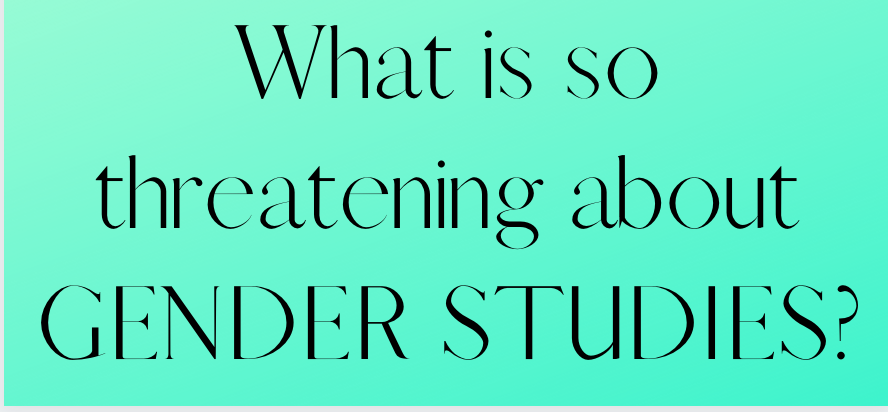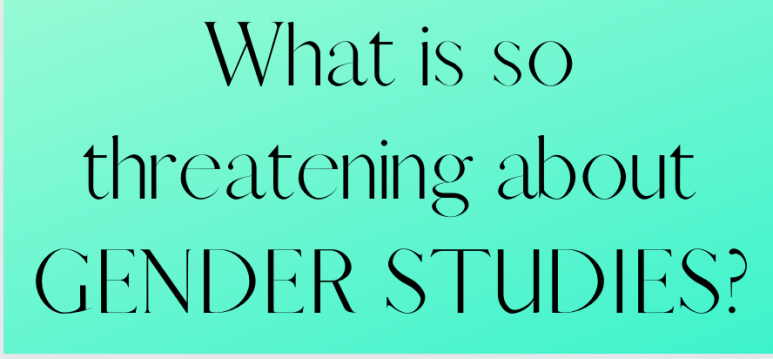Date: 11 July 2019
Country: Europe
by: Mikhail Yakovlev

 Last year, Hungarian Prime Minister Viktor Orban became the first European leader to ban gender studies, arguing that the discipline is an ideology, rather than a science and should not receive university accreditation.
Last year, Hungarian Prime Minister Viktor Orban became the first European leader to ban gender studies, arguing that the discipline is an ideology, rather than a science and should not receive university accreditation.
Since then, there has been a worldwide assault on gender and gender studies, fueled largely by divisive media coverage and the rising political power of the far right. While no one else has quite reached the point of banning gender studies, Germany’s Alternatives for Deutscheland Party has pledged to follow Orban’s example, claiming that it disrupts family values. Italian national media smeared a sociologist for conducting research on gender and bullying, effectively shutting down his research. Even Sweden has seen its secretariat for Gender Research evacuated, due to a suspicious package.
You might be wondering, what is so offensive about gender studies?
In a recent article for the Atlantic, Eliza Apperly explains:
“…for the far right, propping up male authority and promoting a nuclear family that sticks to the gender binary are central tenets of the broader nationalist project. By contrast, gender studies promotes a more fluid understanding of self and society, in particular by recognizing gender as something shaped and interpreted by a given social order, as opposed to an immutable biological fact.”
By questioning the gender binary, the very nature of gender studies disrupts the male authoritarianism that brands the far right’s self image, from Orbán’s strongman swagger to Italian Foreign Minister Matteo Salvini’s patriarchal rhetoric.
Mainstream media outlets have played a key role in amplifying the far-right’s anti-gender narrative. While the far right governments in both Italy and Hungary control much of the mainstream media, in countries like Germany, social media has played a role in amplifying these narratives, spreading misleading and inflammatory rhetoric that is difficult to contain.
In both Hungary and Italy, the government-controlled mainstream media is able to further push these narratives. It is therefore easy to discredit an academic by smearing his work through a news broadcast, or publish op-eds as to why gender studies is an illegitimate field of study.
However, in places like Germany, social media has amplified the far right’s anti-gender studies agenda, spreading its toxic narrative with little accountability.
“This brutal mobilization of hate and contempt through the means of toxic narratives has to date been met with little opposition,” Germany’s Amadeu Antonion Foundation wrote in a recent report, looking at toxic narratives commonly spread by the far right. According to their research, social media creates a unique environment that allows fringe voices to construct and disseminate hateful narratives with no editorial oversight and free from legal constraints faced by traditional media. Crucially, social media allows this content to be targeted, producing highly toxic ‘filter bubbles’.
“Anyone who confronts them within social networks, trying to discuss the issues raised, will be abused, insulted and threatened within hours. Counter- speech has often proved to be ineffective. Arguments, statistics and references to research findings often sim- ply lead to insistence on original positions or even to further radicalization and a consolidation of world views. In contrast to these forces, there are comparatively few democratic counter-narratives that make positive reference to equality, human rights and the rule of law.”
But it isn’t just social media that allows the far right’s trolls to run wild, condemning identity politics and interdisciplinary studies. They are infiltrating the academy as well. Last October, a trio of academics – James A. Lindsay, Peter Boghossian and Helen Pluckrose – made a project they had been working on over the last few years public, announcing:. They wrote
“Something has gone wrong in the university—especially in certain fields within the humanities. Scholarship based less upon finding truth and more upon attending to social grievances has become firmly established, if not fully dominant, within these fields, and their scholars increasingly bully students, administrators, and other departments into adhering to their worldview. This worldview is not scientific, and it is not rigorous. For many, this problem has been growing increasingly obvious, but strong evidence has been lacking. For this reason, the three of us just spent a year working inside the scholarship we see as an intrinsic part of this problem.”
In order to carry out their project, they claimed that they spent one year writing non-sensical academic papers, and publishing them in “respected peer-reviewed journals associated with fields of scholarship loosely known as ‘culture studies’ or ‘identity studies.’” However, what they failed to mention is that their meta-experiment lacked a control—something bizarre for a trio so focussed on scientific rigor. In trying to prove the corruption of so-called “grievance studies,” they only proved the corruption of their own academic practices.
As Harvard University Professor of Women, Gender and Sexuality Studies Sarah Richardson told Buzzfeed the hoaxers followed the [non-existent] alt-right handbook to a tee, using grossly hyperbolic language to overstate their point without actually proving it. While they claimed to publish their findings in leading journals, the first home of most of their research was in fringe publications—another key tactic of the alt-right. As the final straw, they used Twitter to spread their narrative.
But unfortunately, the damage had been done; the pseudo-scientific and scholarly language of their ‘experiment’ tricked many respectable publications into amplifying their highly partial ideology. In one example, the Irish Times (which rightly criticised Orban for his suppression of academic freedom) published the findings of this hoax, showing a lack of fact-checking and communication within the editorial team.
A responsible journalist takes their obligation to counter extreme hate seriously—and the first step to doing this is to check, double check, and check again. While verifying information and countering hateful narratives is important, it is equally important to give a greater voice to people who are marginalized, and being impacted and excluded by this anti-gender, and anti-gender studies discourse. As I wrote last month, a lack of inclusion of trans* and non-gender binary people in the media sector contributes to transphobic, and inaccurate media narratives that publicize hateful content and don’t register the importance of what a loss of gender studies analysis means for public discourse.
To read more about the coded messages of the far right, click here. To read more about gender inclusivity and journalism click here.
